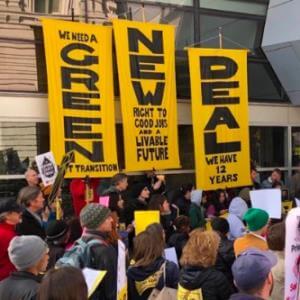Greedy men and women are conspiring to wreck the environment just to enrich themselves.
That has been an unshakable left-wing belief for a long time. It has gained new vigor since The Washington Post revealed that former President Donald Trump has been trawling Big Oil for big money.
At a meeting at Mar-a-Lago, Trump is reported to have promised oil industry executives a free hand to drill willy-nilly across the country and up and down the coasts and to roll back the Biden administration’s environmental policies. All this for $1 billion in contributions to his presidential campaign, according to The Post article.
Trump may believe that there is a vast constituency of energy company executives yearning to push pollution up the smokestack, disturb the permafrost, and drain the wetlands. But he has gotten it wrong.
Someone should tell Trump that times have changed and very few American energy executives believe — as he has said he does — that global warming is a hoax.
Trump has set himself not only against a plethora of laws but also against an ethic, an American ethic: the environmental ethic.
This ethic slowly entered the consciousness of the nation after the seminal publication of “Silent Spring” by Rachel Carson in 1962.
Over time, concern for the environment has become an 11th Commandment. The cornerstone of a vast edifice of environmental law and regulation was the National Environmental Policy Act of 1969. It was promoted and signed by President Richard Nixon, hardly a wild-eyed lefty.
Some 30 years ago, Barry Worthington, the late executive director of the United States Energy Association, told me the important thing to know about the energy versus environment debate was that a new generation of executives in oil companies and electric utilities were environmentalists, that the world had changed and the old arguments were losing their advocates.
“Not only are they very concerned about the environment, but they also have children who are very concerned,” Worthington told me.
Quite so then, more so now. The aberrant weather alone keeps the environment front and center.
This doesn’t mean that old-fashioned profit-lust has been replaced in corporate accommodation with the Green New Deal or that the milk of human kindness is seeping from C-suites. But it does mean that the environment is an important part of corporate thinking and planning today. There is pressure both outside and within companies for that.
The days when oil companies played hardball by lavishing money on climate deniers on Capitol Hill and utilities employed consultants to find data that proved coal use didn’t affect the environment are over. I was witness to the energy versus climate and environment struggle going back half a century. Things are absolutely different now.
Trump has promised to slash regulation, but industry doesn’t necessarily favor wholesale repeal of many laws. Often, the very shape of the industries Trump would seek to help has been determined by those regulations. For example, because of the fracking boom, the gas industry could reverse the flow of liquified natural gas at terminals, making us a net exporter, not an importer.
The United States is now, with or without regulation, the world’s largest oil producer. The electricity industry is well along in moving to renewables and making inroads on new storage technologies like advanced batteries. Electric utilities don’t want to be lured back to coal. Carbon capture and storage draws nearer.
Similarly, automakers are gearing up to produce more electric vehicles. They don’t want to exhume past business models. Laws and taxes favoring EVs are now assets to Detroit, building blocks to a new future.
As the climate crisis has evolved, so have corporate attitudes. Yet there are those who either don’t or don’t want to believe that there has been a change of heart in energy industries. But there has.
Three organizations stand out as pushing old arguments, shibboleths from when coal was king and oil was emperor.
These groups are:
The Sunrise Movement, a dedicated organization of young people that believes the old myths about big, bad oil and that American production is evil, drilling should stop, and the industry should be shut down. It fully embraces the Green New Deal — an impractical environmental agenda — and calls for a social utopia.
The 350 Organization is similar to the Sunrise Movement and has made much of what it sees as the Biden administration’s environmental failures—particularly, it feels the administration has been soft on natural gas.
Finally, there is a throwback to the 1970s and 1980s: an anti-nuclear organization called Beyond Nuclear. It opposes everything to do with nuclear power even in the midst of the environmental crisis, highlighted by Sunrise Movement and the 350 Organization.
Beyond Nuclear is at war with Holtec International for its work in interim waste storage and in bringing the Palisades plant along Lake Michigan back to life. Its arguments are those of another time, hysterical and alarmist. The group doesn’t get that most old-time environmentalists are endorsing nuclear power.
As Barry Worthington told me: “We all wake up under the same sky.”
